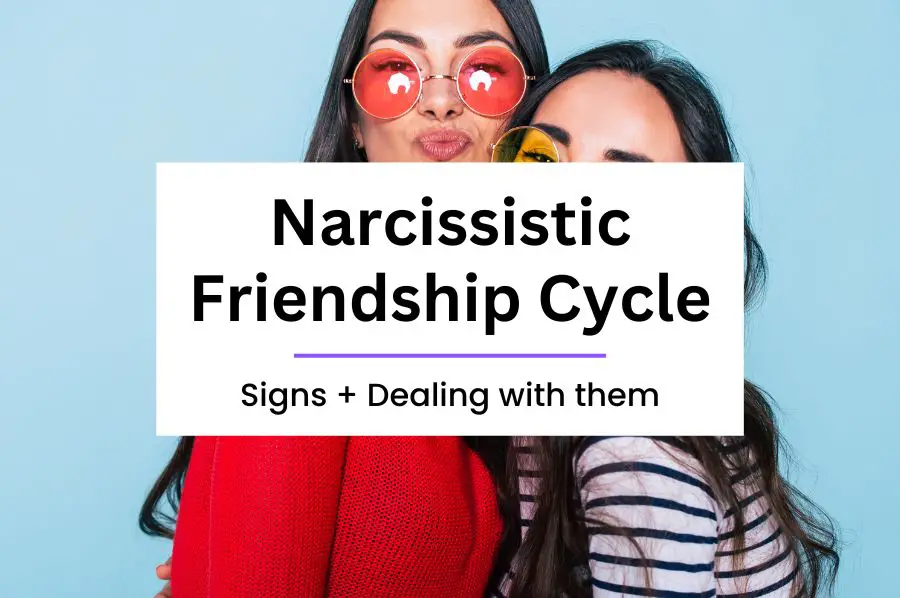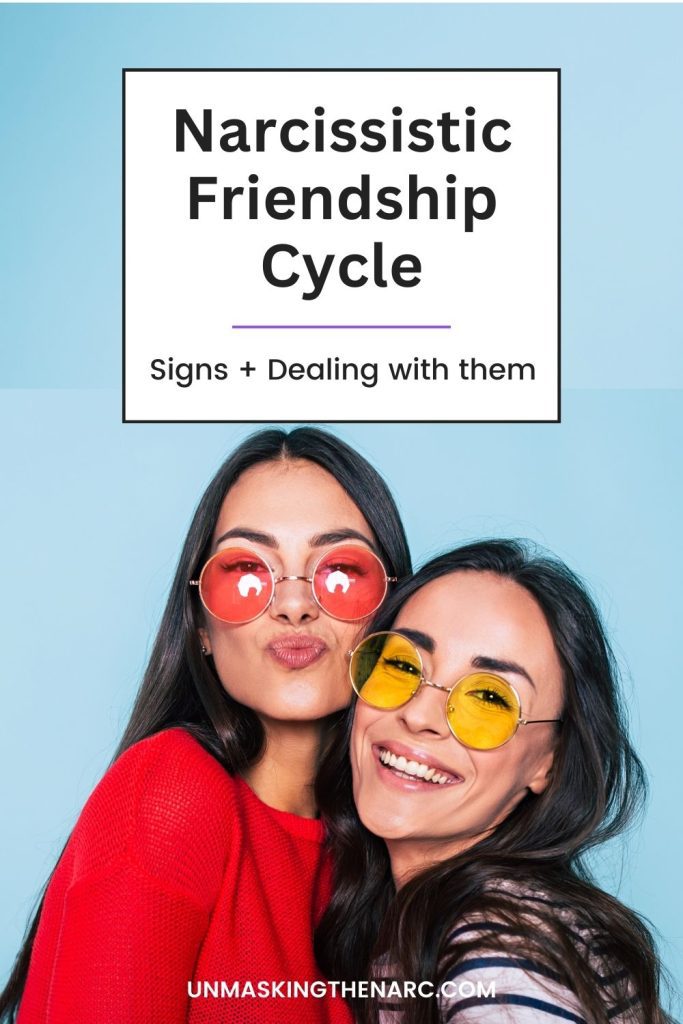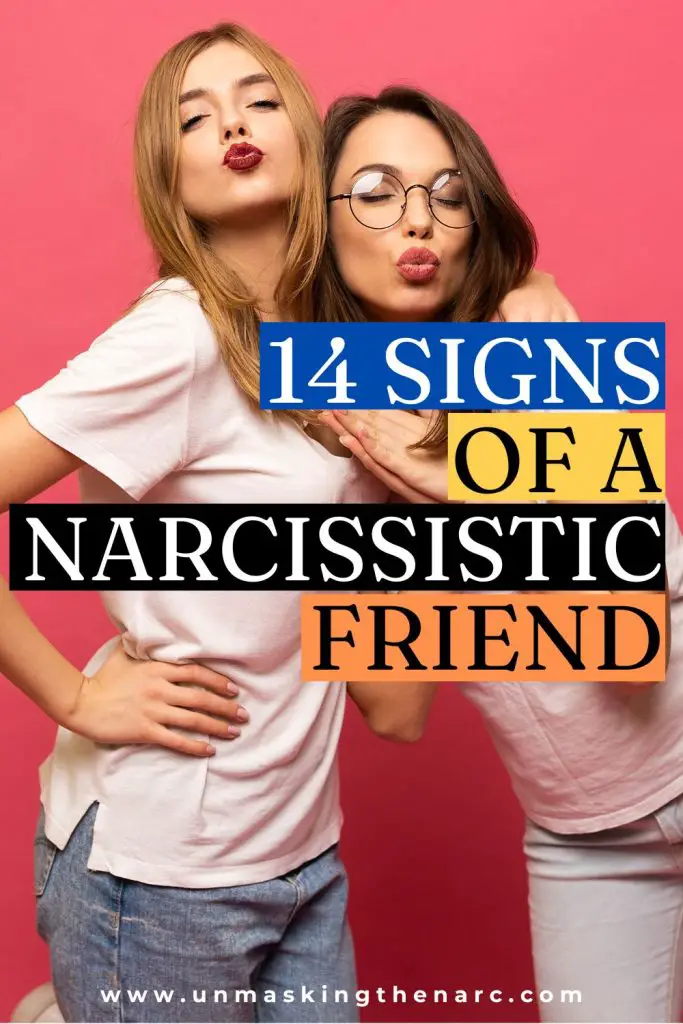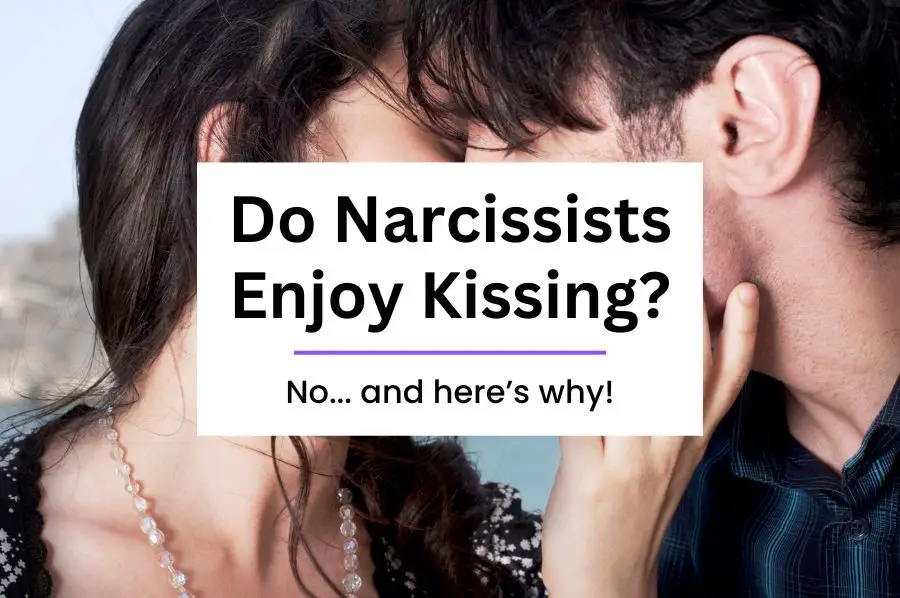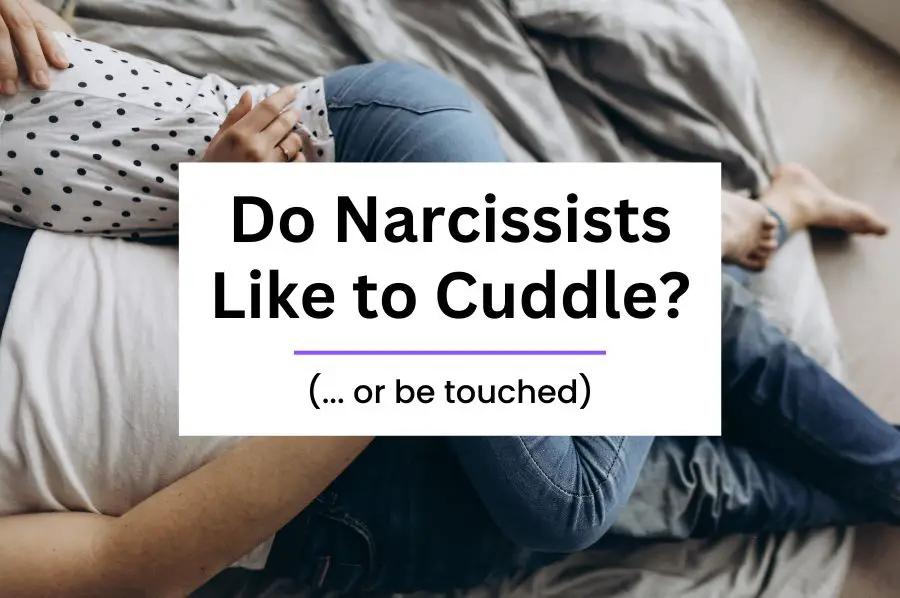Have you ever had a friend who goes from hot to cold with you? One minute you’re the best thing since sliced bread, then two weeks later they’ll ghost you and pretend like you don’t even exist!
There’s a chance you may be dealing with a narcissistic friendship cycle.
I can think back to my high school years and pick a few friends who were very much like that. At the time, I was so confused when they went cold on me, and I was always left thinking, “What did I do wrong?” Then, when they’d pull (hoover) me back in, I’d be overcome with feelings of such relief.
Unfortunately, narcissistic friends don’t always get left behind in high school. They grow to become narcissistic adults, who will inevitably have friends along the way, which they will drag through the stages of the narcissistic friendship cycle.
This post may contain affiliate links. For more information, see our disclosures here.
5 Stages of a Narcissistic Friendship Cycle
Narcissists are actually pretty cookie-cutter in the way that they function, whether they are a friend, co-worker, family member or intimate partner.
When you have a narcissistic friend in your life, you can bet that you’ll be cycling through the stages of their abuse cycle until they either discard you, hoover you back in, or you walk away for good.
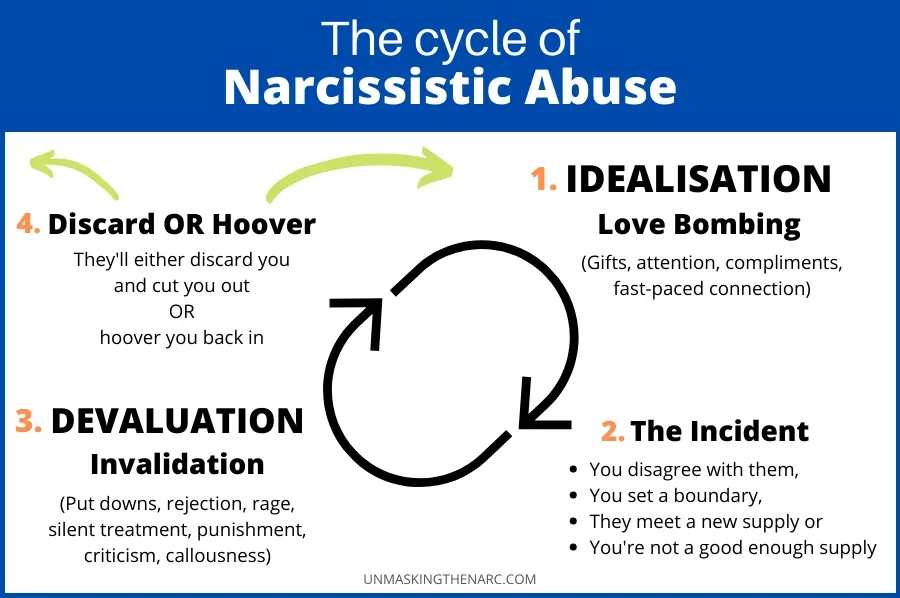
STAGE 1: Idealisation
The first stage is idealisation, which is where narcissistic friends are notoriously known for ‘Love Bombing.’ During this phase, you are their newest and shiniest toy.
The idealisation phase is where the narcissist friend has pegged you as their most exciting and valuable source of supply in that moment. They want to hook you in and secure you because they don’t want to lose that supply.
The way that they will hook you is through a mixture of charm, generosity and appearing to offer you the traits that you value in a friendship.
How do they know what you’re looking for? They’ll gain your trust extremely quickly so that you open up to them and spill many of your greatest desires, hopes, dreams and fears.
Narcissistic friends are very good at mirroring people in a way that leaves you thinking, “Oh my goodness, they just get me. We share so many of the same dreams and hobbies. This friendship must be fated.”
The idealisation phase can be completely intoxicating.
Things you can expect during the idealisation phase:
- Gifts and generosity
- Praise
- Attention and admiration
- Compliments and flattery
- Sharing stories
- Sympathy
- Promises
It’s only natural for your brain to think that the person you get to know in the beginning is who that person must truly be. So, when the next phases come into play, it’s easy for you to rationalise any cruel or negative behaviour.
STAGE 2: The Incident
The next stage that will happen in the narcissistic friendship cycle is when some type of incident occurs, which ends the idealisation phase and leads to devaluation by the narcissist.
More often than not, you won’t even know what ‘the incident’ was. You may have said something in passing that triggered a narcissistic injury in them.
Or you may have set a boundary that the narc doesn’t like, whether it was intentional or not.
| Narcissistic Injury A narcissistic injury is where a deep emotional trauma is triggered within the narcissist, which causes extreme devastation to their ego’s pride and self-worth. As the narcissist refuses to acknowledge their own wounds, they will respond to the attack on their ego (whether real or perceived) by seeking to punish the person who triggered it in the first place. |
Other reasons may be that your sense of self is too strong and the narcissistic friend knows they won’t be able to manipulate you enough or they may have even found a better supply in someone else.
Examples of things that can lead to devaluation:
- Disagreeing with them
- Setting a boundary
- The narcissist finds a new ‘better’ supply
- They get bored with you
- You start to see through them
- They feel you slipping away and need to tighten their grip on you
- You’re completely depleted and have nothing left to give
STAGE 3: Devaluation
Next in line comes the devaluation stage of the narcissist friendship cycle. By this point, the narcissist has hooked you in, and pieces of their real self start to slip through.
It’s extremely exhausting for narcissists to pretend to be nice, charming, attentive and generous, so you can guarantee that the mask will drop from time to time.
You see, when the narcissist killed off their True Self many years ago, they also cut off the traits that make someone authentically human, such as kindness, compassion and empathy.
They aim to weaken you in order to more easily control you.
As hard as it is to grasp, the narcissist does not actually care about you at all. You are merely there to serve them and feed them with narcissistic supply. That is it.
However, our mind struggles to comprehend or see the narcissist as they truly are because their manipulations are so heavy and well-played, especially during the love bombing phase.
Examples of devaluations:
- Insults and criticisms
- Put-downs
- Rejection
- Rage
- Silent treatment
- Passive aggression
- Blame
- Public ridicule
- Gaslighting to keep you confused and doubting your own reality
| READ: 100+ Gaslighting Phrases → |
STAGE 4: Discard

The final stage in the narcissist friendship cycle is the discard.
Discard is pretty much as it sounds. The narcissist is done with you, and they’re ready to get rid of you. You’re now a depleted toy, which is no longer serving as a suitable source of supply for their ego’s insatiable hunger.
This is where the narcissist abandons you.
How a narcissist discards:
- Ignores and ghosts you
- Totally disappears
- Blames you for everything
- Increases the devaluations
- They’ll put in zero effort
- Withholds information, emotions, resources etc.
- Starts a smear campaign (spreading false stories about you to others)
- Their mask completely falls off (you see the real them for the first time, and it’s nasty!)
| READ: More Discard Signs → |
STAGE 5: Hoover
Sometimes, when a narcissistic friend discards you, it’s final. All you’re left with is the intense trauma of the whole experience, and you’re probably wondering where it all went wrong.
If you don’t know that you’re dealing with a narcissist at the time, you’ll likely be deeply hurt, confused and blame yourself for what you could have done differently.
None of it was your fault!
Narcissists are deeply flawed vessels who cut off their own divine connection. They now spend their lives seeking out the life force energy from others, much like a drug addict.
They are nothing less than energy vampires who lack the ability to have compassion towards other human beings.
Oftentimes, narcissistic friends like to keep their old toys on the shelf for a later date, when energy becomes limited and they need a backup source.
This is why they’ll often hoover old supplies back into their twisted web after they’ve already discarded them.
Narcissist hoovering tactics:
- Randomly reach out
- Appear remorseful
- Act as if nothing has happened and continue as normal
- Use important dates to contact you (e.g. birthday or Christmas)
- Give gifts or money
- Play the victim or guilt trip you
- Urgently need your help
| READ: 12 Common Hoover Tactics → |
They will come back into your life as if nothing had happened and start the idealisation phase all over again.
It will probably look a little different or be less intense than the initial love bombing phase that you first experienced with them. After all, they know all of your weaknesses and pain points now. Plus, they already know which tactics they can use to get you back in the game.
You may feel as though they’ve seen the error in their ways and that they’re sorry for hurting you. Don’t be fooled. If anything, the devaluations and abuse will only get worse this time.
If you’ve already gone No Contact with the narcissist, stick to your guns and DO NOT let them back in, no matter what they try to pull.
Trust me, I’ve been there myself and I know how convincing it can all be. Especially when they play on your empathy and make you feel bad for turning them away. The bottom line is that they’re using emotional blackmail to pull you back in and abuse you all over again.
If they really were a genuine friend, they never would have treated you so badly in the first place. Actions speak louder than words.
| READ: Full Cycle of Narc Abuse → |
If you had to heal from how someone treated you, they should never be allowed back in.

Signs of a Narcissistic Friend
Now that you fully understand the cycle of abuse that narcissists move through, let’s explore some of the other signs that you may be dealing with a narcissistic friend.
They’re Jealous

A narcissistic friend will get very jealous of anything that takes your attention away from them. This is not just hanging out with other friends instead of them, but it also includes giving time and attention to your family, kids, pets, work and hobbies.
They can be extremely needy and put pressure on you to be available to them more and more of the time. Narcissistic friends can make you feel guilty for not spending enough time with them, or they’ll constantly have ’emergencies’ where they need you.
Narcissistic friendships will monopolise your time and energy.
They Always Ask for Favours
Before you know it, with a narcissistic friend, you’re forever being asked to do them favours. Can you watch the kids during the school holidays? Can you give them a lift or lend them some money? Can you go with them to pick up what they need?
At first, it seems all good. I mean, that’s what friends are for, right? But after a while, you notice that you’re the one doing all the favours and you begin to feel a little dirty and used.
If you set a boundary and say ‘No’ sometimes, they’ll punish you in some form. Quite often, they’ll pull back from you and dish out the silent treatment. They want to let you know that your disobedience is not okay, and now you need to grovel back to them.
| READ: Common Things Narcs Will Say → |
They Withhold
If a narcissist friend feels slighted by you in any way (whether you’re aware of it or not), they’ll withhold from you as a form of punishment. They may withhold information, invitations, affection, time and of course inflict their vengeful silent treatment on you.
| READ: Why the Narc Ignores You → |
You Feel Drained

At the beginning of the friendship, you were probably having a great time. Your friend was fun, energetic and even generous. But once you stop giving them attention at the maximum capacity they crave, everything shifts, and you’re often left feeling completely drained.
In fact, hanging out with them just isn’t fun any more.
That’s because a narcissist is all about taking, while you’re expected to do all of the giving. It’s a one-way friendship, which does not work on reciprocation at all.
Everything with a narcissist is transactional. If they do something for you, they’ll then expect you to be at their service forevermore.
It’s All About Them
Over time you’ll start to realise that all of the discussions are one-sided and you end up feeling like everything is always about them. They never ask how you are, or if they do, they won’t respond to what you say.
They always dominate the conversation.
A narcissistic friend will spend the whole time talking about themselves and seem to have an innate ability to bring any topic of conversation right back to them.
When it comes to planning things to do, things are always how they want them. They’re not flexible with what others want and will manipulate to get their way.
Very Competitive
Not every competitive person is a narcissist, but every narcissist is competitive. They must be the best, most successful, most beautiful and/ or the most sought-after person on the planet.
They’ll compete with everyone, especially in conversations. You may also find your narcissistic friend competing with you on many unspoken levels – you just feel it.
They Thrive on Gossip

Narcissists are never genuinely happy with the achievements or accomplishments of others. Given that they’re highly competitive and lack empathy, they do not want the people around them to be doing well… unless it reflects well for them in some way.
If they can ride the coattails of a successful friend for a while, they will use them if they have the chance.
Narcissistic friends love to gossip about others and think it’s their God-given right to pull everyone else down a peg or two. They are loyal to no one, including you. If they’re trashing others, know that they won’t hesitate to do the same to you.
They Won’t Take Accountability
Whether it’s giving wrong directions or causing someone a great deal of hurt, the narcissist will not take accountability for their part in the negative outcome of anything.
However, if something turns out wonderfully, they’ll be the first ones to take all of the credit, even if they did nothing to deserve it.
Remember, narcissistic friends are loyal to no one but themselves. If they need to throw you or anyone else under the bus to save themselves, they’ll do it with a smile.
They Can Dish It, But Can’t Take It
As we’ve just covered, narcissists love to trash, invalidate and gaslight others. They can be absolutely awful! They’re total mean girls (or guys).
Yet, the minute any insult or criticism comes their way, they will transform into someone completely unhinged. They can be rageful or will stonewall the perpetrator (walk out as though you don’t even exist). They may seek revenge and go on a smear campaign to punish the person who criticised them.
Another of their favourite tactics is to flip the script and blame you for the very things that they’re doing (projection). They can be extremely petty and childish, “But what about when you did/ said…”
You’ll Hear the Same Stories on Repeat

Narcissistic friends think they’re superhuman and supremely superior.
As a way of continuously painting that false image of themselves to others, they’ll have filed away every little thing they’ve ever achieved or done for someone else (whether true, embellished or completely fictional).
They’ll use any opportunity they can to keep regurgitating their glory stories to make themselves look good, but it won’t take long for you to realise it’s the same five stories on repeat.
Narcs will also repeat any stories that put them in the position of being the ‘poor victim,’ if that helps to manipulate their agenda.
They’ll Be Passive Aggressive
During the idealisation phase, the narcissist makes you feel like you’re two peas in a pod and that they love everything about you. So, it can come as a bit of a blow when, down the line, the narcissistic friend starts to make put-downs and invalidating comments about you.
They may say things like, “I’m so glad you could meet my other friends, but I guess you’re just not their type,” or “I love your laugh, but next time we go out, could you please tone it down a little.”
They’ll also use humour to disguise their belittling comments about you. Then, if you express that you were hurt by the comment, they can laugh it off and tell you to lighten up, it was just a joke!
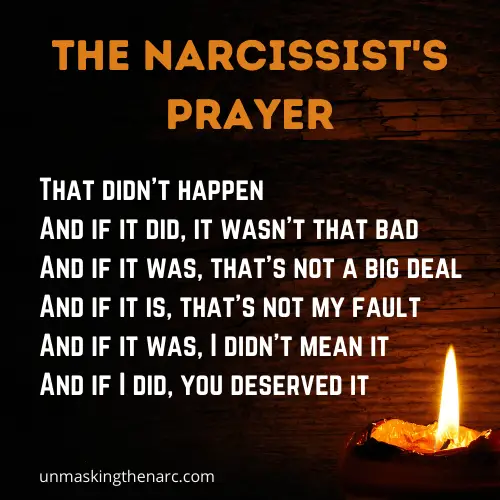
| READ: A Narcissist’s Creed → |
They Have an Unhealthy Need for Validation
Narcissistic friends need a ridiculous amount of validation.
As they relay stories, they’ll put you on the spot and demand confirmation that they are in the right (even when they’re not).
The narcissist will make you feel trapped because you don’t want to offend them and risk having them get angry if you tell them the truth, so you end up agreeing with them just to keep the peace.
“She says that I never listen, but I’m a great listener, aren’t I?”
They will constantly tell you how good they are at things and reiterate the praise others have given them, putting you in the position of needing to further validate their storyline and feed their ego.
However, validation and kind words are a one-way street with a narcissistic friend. They will happily gather them up without ever reciprocating those words of kindness back to you unless they need to use them as a manipulation tactic.
Narcissists are the ultimate FIGJAM!
- F***
- I‘m
- Good,
- Just
- Ask
- Me!
They’re Heavily Focussed on Appearances

The narcissist’s ego is what rules their world, and that ego is all about appearances. Narcissistic friends are heavily focused on material items, how they look, making sure they’ve got the newest and greatest car, house, tech gadgets and so on.
They want to always be the ‘perfect’ one, and wrapped up in that perfection is how they look to the world… as if the world cares what brand name they’re wearing, right?
It’s a skewed and unhealthy perspective that narcissistic friends put an extreme amount of weight on.
Along with perceiving themselves as perfect, they are extremely judgmental of others. Anything they can find to bring others down is what they’ll pick on to elevate themselves.
They Lack Empathy
When narcissists cut off their true selves, which was a trauma response as a young child, they also cut off their empathetic ability.
Without empathy, narcissists really cannot compute how their appalling behaviour hurts and negatively affects those around them.
You’ll notice in a narcissistic friendship that they lack empathy towards others and yourself. They can fake empathy in the idealisation or hoovering phases because they know it will gain your trust and hook you in. But authentic empathy and compassion do not exist within them; therefore, they act without conscience.
You will not be able to reason with them or help them see your side of the story, as they simply do not care.

How to Deal with a Narcissistic Friend
Walk Away (No Contact)

If you want to end a narcissistic friendship and have the ability to do so without too much collateral damage, going No Contact would be my first recommendation.
They do not actually care about you because you’re merely a source of narcissistic supply to them. If you stick around until they’ve used you up and decide to spit you out, you’ll end up feeling even worse than if you’d walked away of your own accord.
Bear in mind that if they’re not done with you yet, you may have to contend with guilt trips, smear campaigns and other nastiness.
Hold your head high, knowing that you are a fully grown, healthy person. The narcissist, however, is much like an overgrown toddler in an adult’s body. Let them stand there stamping their feet and throwing a tantrum as you walk away.
You’ll be making room in your life to form friendships with people who truly value you as a person, rather than with someone who uses you as nothing more than a source to siphon energy from.
Fade Away (Low Contact)
If you are too connected with the narcissist to be able to go No Contact and delete them from your life for good, you may need to do the slow fade.
Maybe you still need to work with them, or you know you’ll run into them from time to time due to mutual friends.
The safest bet for you is to reduce your contact with them and pull back on engaging with them as often. Hopefully, they’ll have a new supply to focus on, which may reduce the amount of energy they put into you leaving them.
Don’t call them out and let them know that you’re onto them. If you call them a narcissist, their vengeance will be brutal because, after all, “How dare you!”
You’ll have to be okay with the fact that you won’t get any closure, and they will never see how hurtful they’ve been towards you. They simply do not care. If you do point out any of their flaws, their ego with flip and you’ll see who they are behind the mask. It’s not pretty, and if you can avoid it at all costs, then avoid it.
Lift Your Vibration

The final piece of the puzzle for you is to lift your vibration to a frequency that simply cannot support narcissism. That way, you’ll never have to worry about attracting narcissistic friendships in the future.
How do you do that? By focusing on yourself and your own inner healing.
There’s no doubt about it, the effects of narcissistic abuse in any type of relationship are just devastating. I know what you’re going through, I’ve been there myself with narcissistic friends, a narcissistic parent and even a narcissistic marriage.
I was so broken that I thought I’d never heal. I had no idea how to pull back the millions of pieces of myself that had been shattered and scattered.
In all honesty, the only thing that I’ve found to have truly turned my life around is through energetic healing. It’s the process of removing each trauma from your body, bit by bit, until you’re no longer holding onto the accumulation of your painful experiences and deep wounding.
Finding a good therapist and working with them regularly is really the only other way to work through the trauma of narcissistic abuse.
As time goes on and you work through your healing, life becomes lighter, the wounds shift, and you make space for the good things to finally come to you.
Once we’ve set solid boundaries within ourselves, have healthy self-esteem, and we’ve totally met ourselves, toxic people are no longer able to come in and take advantage.
I truly hope that you’ve found some answers in this article on narcissistic friends and feel good about moving forward into a healthier life.
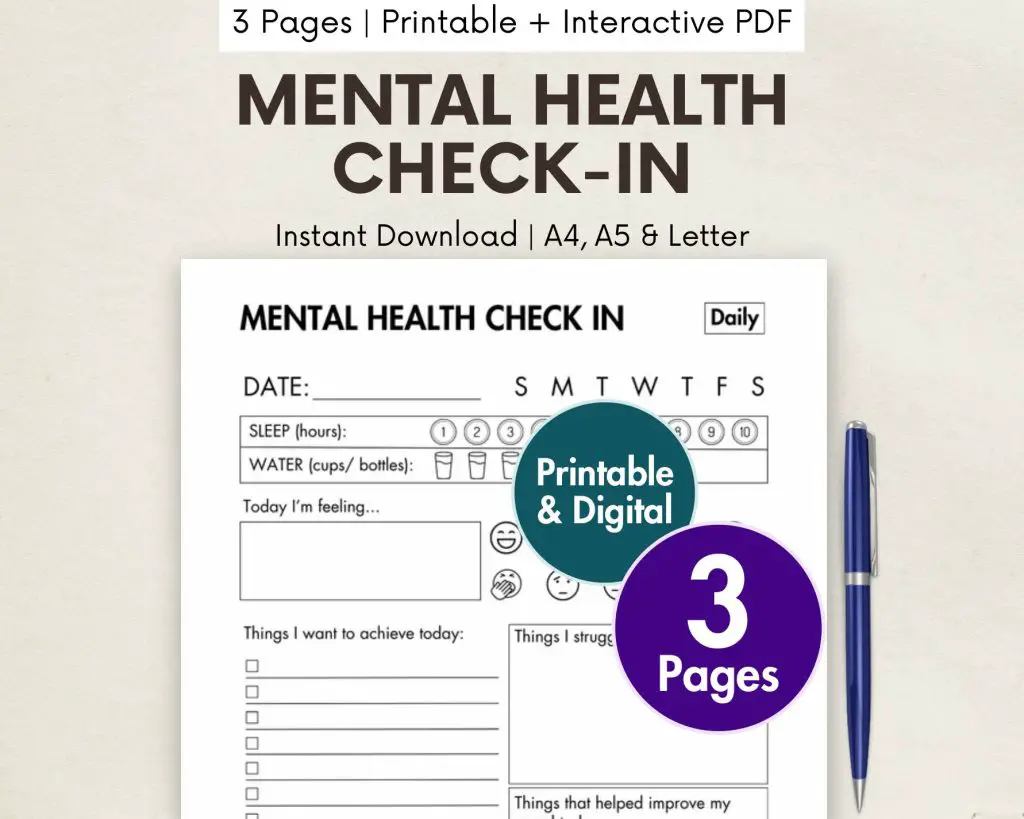
Mental Health Check-in
Keep track of your mental well-being with these fun journal sheets!
- Sleep tracker
- Water intake
- Mood/ emotion tracker
- Struggles & ahievements
- Daily + Weekly + Monthly
- PRINTABLE & DIGITAL

